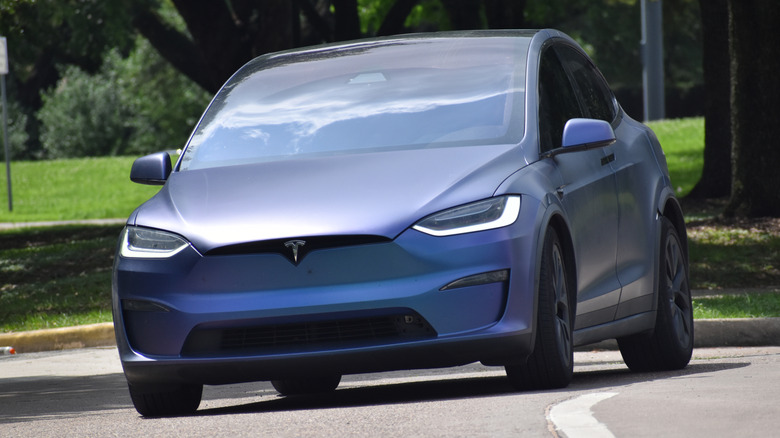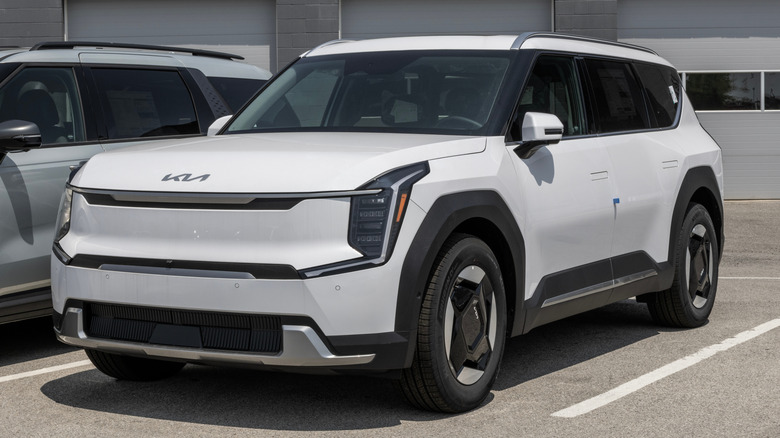Are EV SUVs Safer Than Gasoline-Powered Models? The Answer Is Complicated
Few changes have been as prominent or as revolutionary for the automotive industry as the move toward mass-electrification. Even though electric vehicles promise lower emissions, better performance credentials, and cutting-edge tech, does showcasing everything EVs are better at than regular combustion engines equate to EV SUVs being safer than gasoline-powered models?
Well, the answer isn't straightforward. Experts cited by Plug In America say that EVs are at least as safe as their gasoline-powered counterparts. In some instances, like in this IIHS evaluation from 2021, EV SUVs even offer superior crash protection. However, this comes with a few notable caveats: EVs are heavy, and they operate silently, both of which raise new safety considerations that are likely going to need years of real-world data to properly evaluate.
Clear evidence suggests that the story of EV SUV safety is not black and white, as it is more about the practical balance of clear benefits and existing concerns. Compared to gasoline SUVs, regulatory bodies, safety institutes, and carmakers still lack sufficient data to make a conclusive long-term comparison. Let's take a closer look at what we know so far, and what remains to be proven, for EV road safety.
Electric SUVs are heavier and need more stopping power
Speaking to InsideEVs, Ford CEO Jim Farley acknowledged the inherent challenges to heavy electric SUVs: "These vehicles have worse aerodynamics and they're very heavy, which means very large and expensive batteries," Farley said. This clearly highlights the new safety concerns that come with electric SUVs, especially when it comes to weight and how they react at higher speeds.
According to a crash study carried out by The Midwest Roadside Safety Facility at the University of Nebraska–Lincoln, EVs are on average 20-50% heavier compared to their gasoline counterparts. They are also much quieter, and this tests the very limits of the existing road infrastructure while also posing added risks for pedestrians, cyclists, and lighter vehicles, particularly due to the dangers of silent electric cars. For example, the new Hummer EV weighs as much as 10,000 pounds; and the heavier the vehicle, the more force it exerts in a collision scenario.
More weight also equates to more time needed to stop the car in the event of an emergency. It also means that the car isn't as maneuverable or as agile as a comparably lighter one. For context, the heaviest gasoline-powered Hummer is the H2, and it weighs roughly 3,000 pounds less than the Hummer EV.
What makes EV SUVs safer on the road
One of the most frequent safety criticisms of electric cars is that they are more prone to fire hazards, but that is not exactly the case. Talking to the Guardian, Colin Walker, Head of the UK Transport at the Energy and Climate Intelligence Unit, said, "All the data shows that EVs are just much, much less likely to [catch] fire than their petrol equivalent," thus contradicting what most people think.
Moreover, EVs are packed with technology, offer Advanced Driver Assistance Systems (ADAS), and also benefit from a reduced risk of rollover because of a lower center of gravity. This is especially important for SUVs, as they are naturally more prone to rollover accidents since they're higher off the ground. EVs also gain the advantage by not having large gasoline engines in the front, freeing up space for more effective crumple zones that better absorb impact forces in a collision.
Transmissions work differently in electric cars; they can distribute torque instantly and thus allow the driver to react to unforeseen traffic situations quicker. These are paired with advanced traction control systems, fewer moving parts, and regenerative braking, all of which add to the overall safety of an electric SUV. Electric SUVs show significant promise in many areas of on-road safety, especially for the people inside. Ultimately, what makes an electric SUV really safe is a conscious driver who understands the inherent limits of an EV platform, and can predict how such limitations affect real-world driving.


